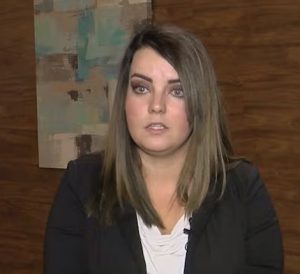The Kentucky Supreme Court has sided with four Southern Baptist Convention entities that — among others — sought to deny a sexual abuse victim an extension of the statute of limitations to file a claim against those she believes knew of her abuse and did not act.
Samantha Killary sought to file legal claims against her father, Sean Jackman; as well as his girlfriend, Linda Thompson; her grandfather, Rick Jackman; and the Louisville Metro Police Department, where both Jackman and Thompson worked. The case involves alleged abuse that occurred from 1997 to 2009.
She made her claim May 2, 2018, which was nine years beyond the last alleged abuse. At the time, Kentucky’s statute of limitations to file sexual abuse claims was only five years — significantly less than most states, which are typically 10 to 21 years.

Samantha Killary (Screencap from WAVE-TV)
However, while Killary’s case was still in process on appeal, the Kentucky Legislature amended state law to permit an extended statute of limitations for such claims, including a provision to allow later claims against third parties, such as Louisville Metro PD.
At issue in the current Supreme Court case was whether those extensions applied to Killary’s case which, in legal terms, already had “ripened,” meaning it had been settled. Her father, Sean Jackman, already had been convicted on multiple counts of sexual abuse in 2018.
Killary claimed Thompson may have participated in some of the abuse and that her grandfather and Louisville Metro PD knew of the abuse and failed to take action to prevent it.
Although Killary’s third-party claims were made after the original statute of limitations had expired, they were filed within the scope of the amended statute of limitations. The question before the court, then, was whether or how the Legislature intended the amendment to apply retroactively.
Enter the SBC
To the surprise of Southern Baptists and particularly to abuse survivor advocates, the SBC, the SBC Executive Committee, Southern Baptist Theological Seminary and Lifeway Christian Resources submitted an amicus brief arguing against the rights of Killary to benefit from the extended statute of limitations and expanded rights to sue third parties. None of those entities are parties to the case.
That action would have gone unnoticed except for an investigative report by the Louisville Courier-Journal that was published months after the brief was filed — just as the SBC was reeling from national attention over lack of response to sexual abuse in churches. To further complicate matters, Killary grew up in an SBC church in Louisville where she says a youth pastor knew of her abuse and did not act.
The amicus brief was instigated by Lifeway, whose president has for months refused to address questions about the matter.
The amicus brief was instigated by Lifeway, whose president has for months refused to address questions about the matter or to acknowledge whether his trustees were aware of it. News of the brief set off howls of protest from Executive Committee trustees — already deep in defending claims of mishandled knowledge of sexual abuse in churches — who said they had no knowledge of the brief and would have vehemently opposed it.
In the amicus brief, the Southern Baptist entities explained their interest in the case arose because all are “named defendants in a separate civil action pending in a Kentucky circuit court that involves allegations of childhood sexual abuse dating back to 2003.”
They are, the brief states, “non-perpetrator third parties who were allegedly made aware of the abuse and violated common law duties in responding to it.”
That is a reference to a massive lawsuit brought by Hannah Kate Williams.
The SBC and its Executive Committee currently are named defendants in at last two dozen lawsuits related to sexual abuse claims.
Kentucky court ruling
On Feb. 15, the Kentucky Supreme Court issued a ruling against Killary’s expanded claims, stating: “When the statute of limitations expired on the claims of sexual abuse brought against appellants, the legislature became powerless to restart the clock by extending the limitation period or by adding a new trigger. To hold otherwise would create an exception that would swallow the rule against divestment of perfected defenses.”
Justice Christopher Nickell filed a concurring opinion that emphasized the main finding of the court: “In my view, the majority correctly recognized that Kentucky law has long deemed a ripened limitations defense to be a vested right beyond the power of the legislature to impair. I write separately to underscore the constitutional and historical sources of the Kentucky rule which amply justify our divergence from contrary federal authority.”
He quoted an earlier ruling that said: “The General Assembly was not authorized to revive causes of action where the applicable limitation period lapsed prior to enactment of the statutory amendment.”
A judicial dissent
Justice Angela Bisig concurred with the majority in part and dissented in part, saying: “Today’s majority decision thwarts the General Assembly’s express intention to revive civil childhood sexual abuse claims. The legislature’s efforts to revive those claims were not only laudable, but also in furtherance of a compelling governmental interest, narrowly tailored, and wholly within constitutional limits. By failing to give effect to that express intention, today’s decision again gives a windfall to the perpetrators and enablers of childhood sexual abuse, who once more reap the wholly unjust benefit of avoiding liability on the legal technicality of an expired statute of limitations.”
“Today’s majority decision thwarts the General Assembly’s express intention to revive civil childhood sexual abuse claims.”
Bisig continued by explaining those who are subjected to sexual abuse typically are young, “often very young” when the abuse occurs, “and thus frequently lacks either the psychological maturity or the legal and real-world sophistication necessary to begin pursuing justice and compensation in the courts. These obstacles are often only further compounded by the victim’s conflicted feelings, even as an adult, over whether or not to pursue claims against a perpetrator who is often well-known to her, and at times a relative or even a parent.
“Yet, despite these overwhelming obstacles arising solely from the youth of the victim, and through no fault of her own, she is nonetheless often denied any chance to present her claims — much less to receive justice or compensation — before a court of law due solely to the legal technicality of an expired statute of limitations. In such circumstances, the victim of childhood sexual abuse is denied justice, compensation, or an ability to hold the perpetrator accountable, while the perpetrator enjoys the windfall of freedom from civil liability due solely to the passage of time.”
Related articles:
Hannah Kate Williams refiles sexual abuse lawsuit against SBC entities
SBC Executive Committee publicly apologizes to sexual abuse survivor
Guidepost report documents pattern of ignoring, denying and deflecting on sexual abuse claims in SBC
Where are the trustees? | Opinion by Maina Mwaura
Why is Lifeway silent on sexual abuse amicus brief? | Opinion by Mark Wingfield
SBC president apologizes for signing off on amicus brief


